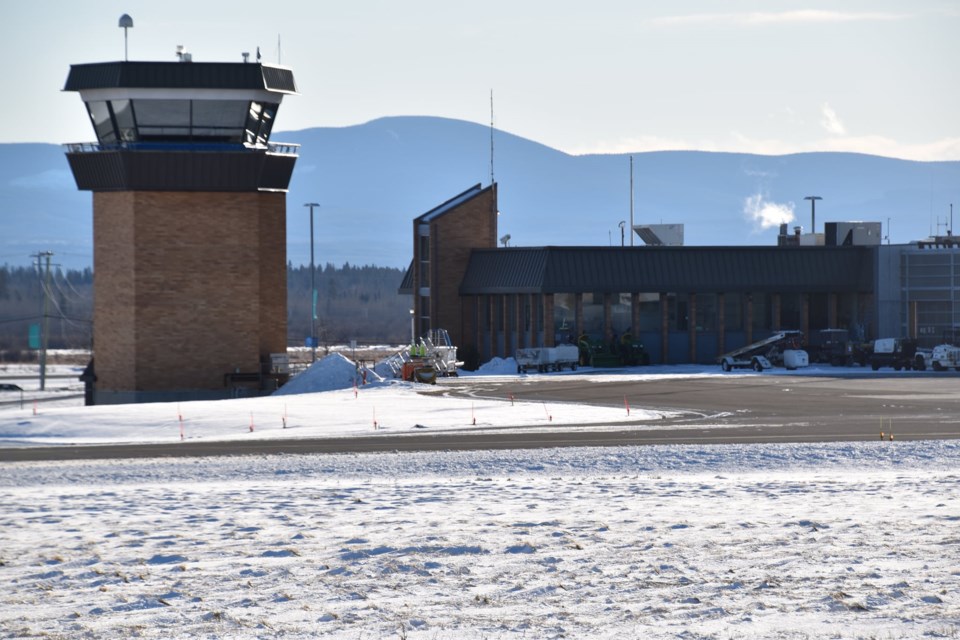The future of Prince George’s air traffic control tower remains in jeopardy as layoff notices are being issued across the country.
The Canadian Air Traffic Control Association (CATCA), the union representing all air traffic control workers, is raising serious public safety concerns about anticipated tower closures and service reductions as a result of an ongoing Nav Canada review.
Nav Canada is the organization that owns and operates Canada’s civil air navigation system, and has been impacted by the downturn in air traffic and financial impacts the aviation industry is facing.
It’s currently undergoing a review to determine 'whether or not service is safe and efficient' with Prince George’s YXS among the airports listed for assessment.
CATCA says last month, more than 100 air traffic controllers received layoff notices, which will severely impact service at four area control centres in Gander, Moncton, Montreal and Edmonton, and at air traffic control towers in St-Jean, Que., Windsor, Sault Ste. Marie, Regina, Fort McMurray, Whitehorse and Prince George.
The union says, prior assurances from Nav Canada that no decisions would be made until the review was completed and approved by Transport Canada, employees at all seven tower sites under review have already received letters stating its intention to close the towers.
Prince George has seven air traffic controllers that would be affected by the tower's possible closure.
According to CATCA President and CEO Doug Best, in Sept. 2020, Nav Canada also terminated its training program including more than 150 trainees.
“It is our opinion that they already have a predetermined outcome hence the reason the layoff notices were given to all the air traffic controllers at the seven towers across the country,” he said in an interview with PrinceGeorgeMatters.
He says either towers will close fully or change to a non-controlled based service or airport advisory service which is still safe but 'not a positive control environment.'
“Air Traffic Control is safer, it is more sufficient and is the best risk management scenario going,” says Best, explaining without Air Traffic Control airports, it would mean massive delays.
“All I can say is this, air traffic control is the safest game in town. There is no ifs, ands or buts.”
What would this mean for Prince George?
Service reductions to air traffic control in Prince George would have many implications for the region.
CATCA says Prince George is currently one of the busiest hubs for MedEvacs outside of Vancouver in B.C. and without air traffic control, there would be delays to their aircraft.
“There will be no delays if there is an air traffic controller there; when if there is not an air traffic controller there will be delays - People’s lives depend on this,” adds Best.
During any poor weather, one aircraft can be on the approach and Prince George regularly has six to eight aircraft arriving at the same time. Without air traffic control, this will result in 30- to 40-minute delays to aircraft in the air and on the ground.
Prince George also experiences fog on a daily basis for much of the spring and fall due to local pulp mills.
CATCA notes that Prince George is home to flight training and commercial helicopter operations. Air Traffic Control has the ability to use positive control in the form of restrictions to separate these aircraft.
Without that, the union says safety would rely on inexperienced students making the decisions or diverting the attention of helicopter pilots practicing emergency procedures.
CATCA says the flight school has already voiced their concerns over this to Nav Canada.
Prince George is also the home of a large aerial forestry base tasked with fighting wildfires. Without the ability of Air Traffic Control to expedite these aircraft, or move other aircraft to accommodate them, CATCA says the damage experienced in northern B.C. in the 2017 and 2018 wildfires could have been much greater.
“Air Traffic Controllers are some of the highest-skilled people that there are,” says Best.
“We are behind the scenes and we don’t really have a lot of comments to make because we don’t like people to have to worry about what is happening, but an air traffic controller has to be 100 per cent right 100 per cent of the time.”
He says Air Traffic Controllers are in high demand throughout the world, and because of the anticipated Nav Canada service reductions Canada risks facing a massive 'brain drain,' especially once the industry begins recovering from COVID-19 impacts.
Best says CATCA is calling on Transport Canada to halt the process and is lobbying the government to step in and keep Nav Canada on its feet.
“The federal government has publicly committed to ensuring that the aviation sector can drive our economic recovery when the pandemic subsides, but with Nav Canada’s service cuts our air navigation system won’t have the capacity to operate safely when traffic returns to normal,” added Best.
Before the pandemic struck, Canada faced a 13 per cent shortfall of air traffic controllers, Nav Canada’s annual overtime bill was $100 million, and Transport Canada ordered them to overhaul its Fatigue Management System as a result of safety concerns.
CATCA says if Nav Canada proceeds with its planned service level cuts, it estimates the shortage of air traffic controllers will grow to 20 per cent by June 2021.




